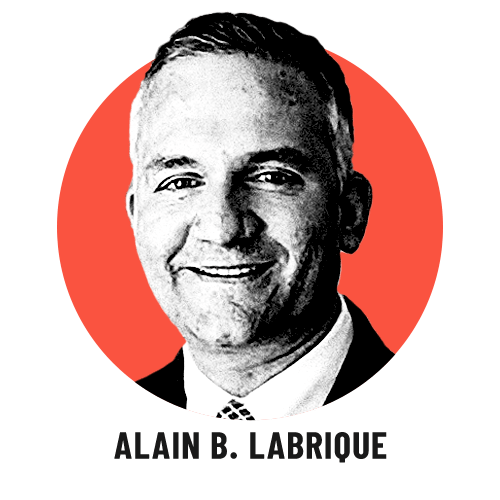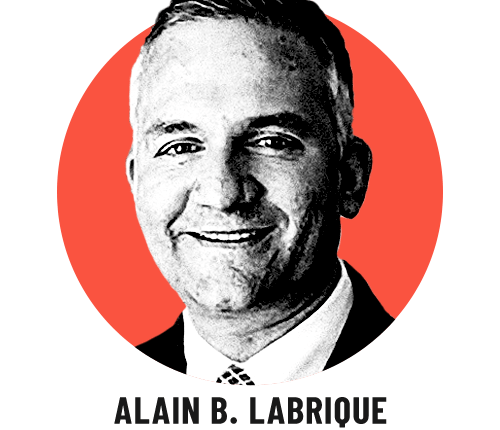Dr. Alain B. Labrique is an infectious disease epidemiologist and associate professor at the Johns Hopkins Bloomberg School of Public Health. The opinions expressed in this commentary are his own.

The recent announcement that Google and Apple are jointly developing an app that could alert you if you have been in contact with someone infected with coronavirus is a prime example of the tensions involved in using digital tools to fight this pandemic. The voluntary participation that is a cornerstone of the companies’ privacy policy means the app may struggle to get a sufficient user base and, as a result, may not have much of an impact.
But it’s urgent that we find a way to strike a balance when it comes to using digital technologies to manage this threat to our health and economy. The United States is moving toward an inflection point in the pandemic where we need a realistic road map for getting America back on its feet without sparking a second surge in infections. The data generated by mobile phones can play an incredibly valuable role by providing insights that can allow public health and economic imperatives to work in sync, rather than in opposition to one another.
Countries like Israel, Thailand and Hong Kong already are effectively using data generated by smartphones to fight COVID-19. In Singapore, the government released an app that uses Bluetooth to identify people who have been in close contact with a COVID-19 patient. South Korea has used cell phone data to create maps showing where infected people went even before they were diagnosed. The public health implications of such data insights are remarkable. But significant privacy concerns have accompanied these moves to compile medical and location data. They are likely to be especially prominent around any effort to use digital tools to fight the pandemic in the United States. We’re a country that has long emphasized the importance of autonomy and individual freedom. There has always been a tension between civil liberties and public health interventions, especially during crises when the suspension of freedoms is for the greater good. Here are a few ways we can take advantage of digital technologies while balancing public health imperatives with privacy concerns. Read More
Anonymous surveys
First, the federal government could use the Wireless Emergency Alerts system to use mobile phone networks to instantly communicate with virtually everyone on the network — about 96% of Americans. There is an opportunity to strategically and judiciously use this incredible level of connectivity to communicate risk, inspire collective behavior and to gain insights into the state of the epidemic at a national level. For example, the system could be used to solicit anonymous answers to a few simple questions, like, “Have you experienced a fever and cough in the last five days?” or, “Are you wearing a mask and practicing social distancing?” This would augment data culled from fragmented and sometimes inconsistent state and local data to glean insights into potential hotspots worth investigating or to understand if mitigation policies are being followed. It can also help improve current disease models where a lack of data is producing sharply different predictions that have enormous health and economic implications.
Real-time data
There are already efforts to use anonymous, real-time data from groups of participating phone users to monitor adherence to social distancing and stay-at-home policies, a critical insight to identify potential hotspots for future outbreaks. Current data is often not sufficiently detailed or nationally representative to assess the situation at the county or city level where it’s most needed. However, such data exists and can be integrated into a reporting system that would include appropriate privacy safeguards. For example, in addition to removing personal data, the geolocation can be blurred to prevent law enforcement agencies from using this data to crack down on a party or church service.
Offer benefits for data sharing
There is the quandary of how to spur widespread adoption of a contact tracing app like the one Google and Apple are building before folks become infected, and even more importantly, once someone tests positive for coronavirus.One approach is to offer incentives — like access to testing and virtual check-ins with health care professionals. Big providers like Kaiser Permanente, Blue Cross Blue Shield and even Medicare could offer service benefits to app users. App activation and data-sharing could be presented via an “opt-out” approach: People would be clearly informed that they will be part of a national COVID-19 mitigation system and they will have an easy way of opting out. Studies suggest higher inclusion rates when participation is seen as the norm, not the exception.
Meanwhile, an additional safeguard could involve establishing a special government-appointed, bipartisan oversight body, with legal, ethical and civil society representation tasked with monitoring privacy standards and moving swiftly to address any issues that arise. Ultimately, we would be foolish to completely reject the powerful insights digital tools can provide, especially as we develop strategies to reopen the economy. When fighting a disease with a 14-day silent incubation period and transmission before the onset of symptoms, we need the best data — especially at the local level — long before an outbreak is well underway. Identifying those who may have been exposed and urging them to quarantine before they spread the disease to others, can stop the virus in its tracks.
Source: edition.cnn.com

